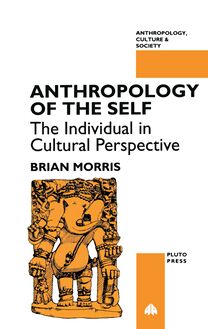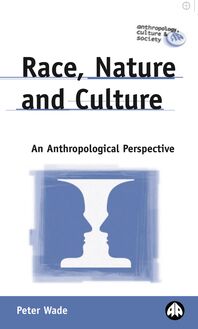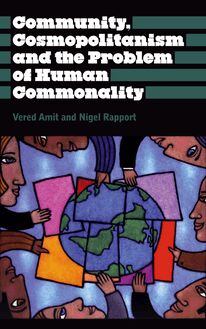-
 Univers
Univers
-
 Ebooks
Ebooks
-
 Livres audio
Livres audio
-
 Presse
Presse
-
 Podcasts
Podcasts
-
 BD
BD
-
 Documents
Documents
-
- Cours
- Révisions
- Ressources pédagogiques
- Sciences de l’éducation
- Manuels scolaires
- Langues
- Travaux de classe
- Annales de BEP
- Etudes supérieures
- Maternelle et primaire
- Fiches de lecture
- Orientation scolaire
- Méthodologie
- Corrigés de devoir
- Annales d’examens et concours
- Annales du bac
- Annales du brevet
- Rapports de stage
La lecture à portée de main
Vous pourrez modifier la taille du texte de cet ouvrage
Découvre YouScribe en t'inscrivant gratuitement
Je m'inscrisDécouvre YouScribe en t'inscrivant gratuitement
Je m'inscrisEn savoir plus
Vous pourrez modifier la taille du texte de cet ouvrage
En savoir plus

Description
Raising fundamental questions such as 'What is anthropology really about?', 'How does the public understand, or misunderstand, anthropology?' and 'What and where do anthropologists study now, and for whom do they write?', Hannerz invites anthropologists to think again about where their discipline is going.
Full of insights and practical advice from Hannerz's long experience at the top of the discipline, this book is essential for all anthropologists who want their craft to survive and develop in a volatile world, and contribute to new understandings of its ever-changing diversity and interconnections.
1. Introduction: In the World, and a World in Itself - Chair of the European Association of Social Anthropologists
2. Editing Anthropology: Two Experiences in Space and Time
3. Diversity Is Our Business
4. Field Worries: Studying Down, Up, Sideways, Through, Backward, Forward, Early or Later, Away and at Home
5. Making the World Transparent
6. Flat World and the Tower of Babel: Linguistic Practices in a Global Discipline
7. Before and After: Exploring the Usable Past
8. And Next, Briefly: Toward 2050
Notes
References
Index
Sujets
Informations
| Publié par | Pluto Press |
| Date de parution | 06 juillet 2010 |
| Nombre de lectures | 0 |
| EAN13 | 9781783713769 |
| Langue | English |
Informations légales : prix de location à la page 0,0005€. Cette information est donnée uniquement à titre indicatif conformément à la législation en vigueur.
Extrait
Anthropology’s World
Anthropology, Culture and Society
Series Editors: Professor Vered Amit, Concordia University and Dr Jon P. Mitchell, University of Sussex
Published titles include:
Home Spaces, Street Styles: Contesting Power and Identity in a South African City L ESLIE J. B ANK
On the Game: Women and Sex Work S OPHIE D AY
Slave of Allah: Zacarias Moussaoui vs the USA K ATHERINE C. D ONAHUE
A World of Insecurity: Anthropological Perspectives on Human Security E DITED BY T HOMAS E RIKSEN , E LLEN B AL AND O SCAR S ALEMINK
A History of Anthropology T HOMAS H YLLAND E RIKSEN AND F INN S IVERT N IELSEN
Ethnicity and Nationalism: Anthropological Perspectives Third Edition T HOMAS H YLLAND E RIKSEN
Globalisation: Studies in Anthropology E DITED BY T HOMAS H YLLAND E RIKSEN
Small Places, Large Issues: An Introduction to Social and Cultural Anthropology Third Edition T HOMAS H YLLAND E RIKSEN
What is Anthropology? T HOMAS H YLLAND E RIKSEN
Anthropology, Development and the Post-Modern Challenge K ATY G ARDNER AND D AVID L EWIS
Corruption: Anthropological Perspectives E DITED BY D IETER H ALLER AND C RIS S HORE
Culture and Well-Being: Anthropological Approaches to Freedom and Political Ethics E DITED BY A LBERTO C ORSIN J IMÉNEZ
Cultures of Fear: A Critical Reader E DITED BY U LI L INKE AND D ANIELLE T AANA S MITH
Fair Trade and a Global Commodity: Coffee in Costa Rica P ETER L UETCHFORD
The Will of the Many: How the Alterglobalisation Movement is Changing the Face of Democracy M ARIANNE M AECKELBERGH
The Aid Effect: Giving and Governing in International Development E DITED BY D AVID M OSSE AND D AVID L EWIS
Cultivating Development: An Ethnography of Aid Policy and Practice D AVID M OSSE
Anthropology, Art and Cultural Production M ARUŠKA S VAŠEK
Race and Ethnicity in Latin America Second edition P ETER W ADE
Race and Sex in Latin America P ETER W ADE
Anthropology at the Dawn of the Cold War: The Influence of Foundations, McCarthyism and the CIA E DITED BY D USTIN M. W AX
Learning Politics from Sivaram: The Life and Death of a Revolutionary Tamil Journalist in Sri Lanka M ARK P. W HITAKER
ANTHROPOLOGY’S WORLD
Life in a Twenty-First-Century Discipline
Ulf Hannerz
First published 2010 by Pluto Press 345 Archway Road, London N6 5AA and 175 Fifth Avenue, New York, NY 10010
www.plutobooks.com
Distributed in the United States of America exclusively by Palgrave Macmillan, a division of St. Martin’s Press LLC, 175 Fifth Avenue, New York, NY 10010
Copyright © Ulf Hannerz 2010
The right of Ulf Hannerz to be identified as the author of this work has been asserted by him in accordance with the Copyright, Designs and Patents Act 1988.
British Library Cataloguing in Publication Data A catalogue record for this book is available from the British Library
ISBN 978 0 7453 3048 8 Hardback ISBN 978 0 7453 3047 1 Paperback ISBN 978 1 8496 4565 2 PDF eBook ISBN 978 1 7837 1377 6 Kindle eBook ISBN 978 1 7837 1376 9 EPUB eBook
Library of Congress Cataloging in Publication Data applied for
This book is printed on paper suitable for recycling and made from fully managed and sustained forest sources. Logging, pulping and manufacturing processes are expected to conform to the environmental standards of the country of origin.
10 9 8 7 6 5 4 3 2 1
Designed and produced for Pluto Press by Chase Publishing Services Ltd, 33 Livonia Road, Sidmouth, EX10 9JB, England Typeset from disk by Stanford DTP Services, Northampton, England Printed and bound in the European Union by CPI Antony Rowe, Chippenham and Eastbourne
Contents
Acknowledgments
Series Preface
1.
Introduction: In the World, and a World in Itself
2.
Editing Anthropology: Two Experiences in Space and Time
3.
Diversity Is Our Business
4.
Field Worries: Studying Down, Up, Sideways, Through, Backward, Forward, Early or Later, Away and at Home
5.
Making the World Transparent
6.
Flat World and the Tower of Babel: Linguistic Practices in a Global Discipline
7.
Before and After: Exploring the Usable Past
8.
And Next, Briefly: Toward 2050
Notes
References
Index
Acknowledgments
Most of the chapters in this book were not originally written to form an integrated and comprehensive treatise on what anthropology is now, or is not, or could be; in their first versions, they came into being as papers for conferences, or lecture series, or other edited volumes. These versions are identified in the endnotes for the particular chapters. As they appear here, however, the chapters have been extensively revised in order to fit better together, and to avoid repetition. Most of them have also been extended.
Let me take the opportunity here, however, to thank the members of those audiences who listened to early versions, and offered useful and generous comments: in Bayreuth, Berkeley, Budapest, Durham, Frankfurt am Main, Istanbul, Ljubljana, Poznan and Vienna.
Furthermore, I have been discussing the matters dealt with in this book, over the years, with a great many friends and colleagues, in many places. It would be impossible to remember all these conversations, and very difficult to draw a line around some smaller number of those conversation partners to be identified by name. It is at least a bit more manageable to thank collectively those circles of colleagues whose friendship, hospitality and intellectual company I have enjoyed in places to which I have had the pleasure of longer-standing links: in Stockholm, Vienna, Tokyo, Oslo, Tel Aviv and Jerusalem, New York and Oxford.
Finally, one close colleague deserves special mention, so let me do something probably seldom done in acknowledgments—I will quote myself: “In particular I am indebted to my wife and colleague, Helena Wulff Hannerz … for her constant thoughtfulness, support, and willingness to listen, read, respond and ask for more” (Hannerz 1992a: ix). True some twenty years ago, and still true.
Ulf Hannerz Stockholm, February 2010
Series Preface
Anthropology is a discipline based upon in-depth ethnographic works that deal with wider theoretical issues in the context of particular, local conditions—to paraphrase an important volume from the series: large issues explored in small places . This series has a particular mission: to publish work that moves away from an old-style descriptive ethnography that is strongly area-studies oriented, and offer genuine theoretical arguments that are of interest to a much wider readership, but which are nevertheless located and grounded in solid ethnographic research. If anthropology is to argue itself a place in the contemporary intellectual world, then it must surely be through such research.
We start from the question: “What can this ethnographic material tell us about the bigger theoretical issues that concern the social sciences?” rather than “What can these theoretical ideas tell us about the ethnographic context?” Put this way round, such work becomes about large issues, set in a (relatively) small place, rather than detailed description of a small place for its own sake. As Clifford Geertz once said, “Anthropologists don’t study villages; they study in villages.”
By place, we mean not only geographical locale, but also other types of “place”—within political, economic, religious or other social systems. We therefore publish work based on ethnography within political and religious movements, occupational or class groups, among youth, development agencies, and nationalist movements; but also work that is more thematically based—on kinship, landscape, the state, violence, corruption, the self. The series publishes four kinds of volume: ethnographic monographs; comparative texts; edited collections; and shorter, polemical essays.
We publish work from all traditions of anthropology, and all parts of the world, which combines theoretical debate with empirical evidence to demonstrate anthropology’s unique position in contemporary scholarship and the contemporary world.
Professor Vered Amit Dr Jon P. Mitchell
1 Introduction: In the World, and a World in Itself
Anthropology’s World , as in the title of this book, can mean at least two things. On the one hand it is anthropology as a social world in itself—the community of a discipline, with its internal social relationships, its ideas and practices. On the other hand, anthropology’s world is the wider outside world to which the discipline must relate in various ways. For anthropology, which more than any other discipline may have a constant ambition to be global in its scope, this involves humanity everywhere, and the attempt to understand its variety of ways of life and thought and its conditions of existence. It is a world anthropologists are inclined to think of as made up of a multitude of “fields”: research sites, actual or potential. In a more close-up sense, however, that outside world also includes people and structures which demand attention on a more everyday, often practical level: wider academic environments, student populations, local or national publics, the media. In both these senses—or perhaps I should say all these senses—the world of anthropology keeps changing.
This book is about some aspects of contemporary life in this world. Anthropology is now a global discipline both through engaging in research everywhere (at least in principle) and in having local practitioners everywhere. Yet within that worldwide community there are variations in scholarly interests and in working circumstances. In what follows I will draw continuously on my own experiences, taking my own path through anthropology’s world. My enduring perspective is from one corner of Europe, but looking out. Over the years, I have developed close ties with anthropologists in this part of the world, but I have also had, and continue to have, some of my own formative experiences in American anthropology. When I have a chance (and such opportunities have included va
-
 Univers
Univers
-
 Ebooks
Ebooks
-
 Livres audio
Livres audio
-
 Presse
Presse
-
 Podcasts
Podcasts
-
 BD
BD
-
 Documents
Documents
-
Jeunesse
-
Littérature
-
Ressources professionnelles
-
Santé et bien-être
-
Savoirs
-
Education
-
Loisirs et hobbies
-
Art, musique et cinéma
-
Actualité et débat de société
-
Jeunesse
-
Littérature
-
Ressources professionnelles
-
Santé et bien-être
-
Savoirs
-
Education
-
Loisirs et hobbies
-
Art, musique et cinéma
-
Actualité et débat de société
-
Actualités
-
Lifestyle
-
Presse jeunesse
-
Presse professionnelle
-
Pratique
-
Presse sportive
-
Presse internationale
-
Culture & Médias
-
Action et Aventures
-
Science-fiction et Fantasy
-
Société
-
Jeunesse
-
Littérature
-
Ressources professionnelles
-
Santé et bien-être
-
Savoirs
-
Education
-
Loisirs et hobbies
-
Art, musique et cinéma
-
Actualité et débat de société
- Cours
- Révisions
- Ressources pédagogiques
- Sciences de l’éducation
- Manuels scolaires
- Langues
- Travaux de classe
- Annales de BEP
- Etudes supérieures
- Maternelle et primaire
- Fiches de lecture
- Orientation scolaire
- Méthodologie
- Corrigés de devoir
- Annales d’examens et concours
- Annales du bac
- Annales du brevet
- Rapports de stage




















